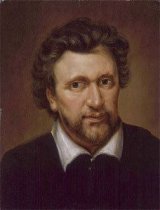Analysis of Anthea'S retractation
Robert Herrick 1591 (London) – 1674 (Dean Prior)
Anthea laugh'd, and, fearing lest excess
Might stretch the cords of civil comeliness
She with a dainty blush rebuked her face,
And call'd each line back to his rule and space.
| Scheme | AABB |
|---|---|
| Poetic Form | Quatrain |
| Metre | 100101011 11011101 1101010101 0111111101 |
| Closest metre | Iambic pentameter |
| Characters | 180 |
| Words | 33 |
| Sentences | 2 |
| Stanzas | 1 |
| Stanza Lengths | 4 |
| Lines Amount | 4 |
| Letters per line (avg) | 35 |
| Words per line (avg) | 8 |
| Letters per stanza (avg) | 139 |
| Words per stanza (avg) | 31 |
Font size:
Submitted on May 13, 2011
Modified on March 05, 2023
- 10 sec read
- 76 Views
Citation
Use the citation below to add this poem analysis to your bibliography:
Style:MLAChicagoAPA
"Anthea'S retractation" Poetry.com. STANDS4 LLC, 2024. Web. 27 Apr. 2024. <https://www.poetry.com/poem-analysis/31273/anthea%27s-retractation>.


Discuss this Robert Herrick poem analysis with the community:
Report Comment
We're doing our best to make sure our content is useful, accurate and safe.
If by any chance you spot an inappropriate comment while navigating through our website please use this form to let us know, and we'll take care of it shortly.
Attachment
You need to be logged in to favorite.
Log In